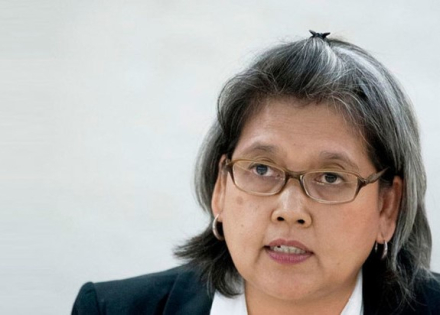Women, Peace and Security in the Asia-Pacific

To honour the 13th anniversary of the United Nations Security Council Resolution 1325, Asia-Pacific College of Diplomacy and ANU Gender Institute welcome Indonesian expert Kamala Chandrakirana.
The lecture is open to public, addressing the theme of women, peace and security in the Asia and Pacific, and the roles the United Nations, as well as the international community can play to ensure strong roles of women in conflict resolution and peace building.
Kamala Chandrakirana is an Indonesian advocate of human rights, justice and democracy. During the conflict-ridden times of 2003-2009 in Indonesia, she was chairperson of Indonesia’s National Commission on Violence against Women, a unique national mechanism for women’s human rights established by Presidential Decree. Under her leadership, the Commission documented violations of women's human rights in several contexts, including in Aceh, Papua, Poso (Central Sulawesi), the rapes of May 1998 and the pogrom of 1965.
Currently, she is an independent expert in the UN Human Rights Council’s Special Procedures mechanism, on the issue of discrimination against women in law and in practice, as well as a member of ESCAP-UN Women’s Asia Pacific Regional Working Group on Women, Peace and Security. She is also a long-time activist in regional and global civil society groups, including as a member of the Asia Pacific Women Law and Development (APWLD), one of the largest network of women’s rights advocates in the region; a resource person for the Southeast Asian Women’s Caucus on ASEAN; and one of the founders of Musawah, a global movement for equality and justice in the Muslim family.
In Indonesia, Kamala has been appointed twice to ad hoc Presidential task forces, for addressing Indonesian migrant workers on death row abroad (2011) and for investigating the death of a prominent human rights defender, Munir (2005). Currently, she is the coordinator of a national coalition of 50 plus NGOs and individuals advocating for truth and justice for past gross human rights violations (KKPK) and is in the governance structures of various civil society organizations, such as the Indonesian Corruption Watch (ICW), a leading anti-corruption advocate; ELSAM, a human rights think-tank; Syarikat Indonesia, a network of progressive Muslim activists pursuing grassroots cultural reconciliation to address past human rights violations; the Indonesian Institute for Social History (ISSI), situating past gross human rights violations as part of historical inquiry; Rahima, an education center on women’s rights within Islam; Fahmina, a Cirebon-based advocacy NGO founded by pesantren-based theologian-activists; and, Indonesia for Humanity, an NGO focused on public fund-raising and grant-making to support community empowerment.
This lecture is free and open to the public (please RSVP below).
Light refreshments will be served.
RSVP by 30 October 2013 to Susan Harris-Rimmer or phone 6125 2177
.






